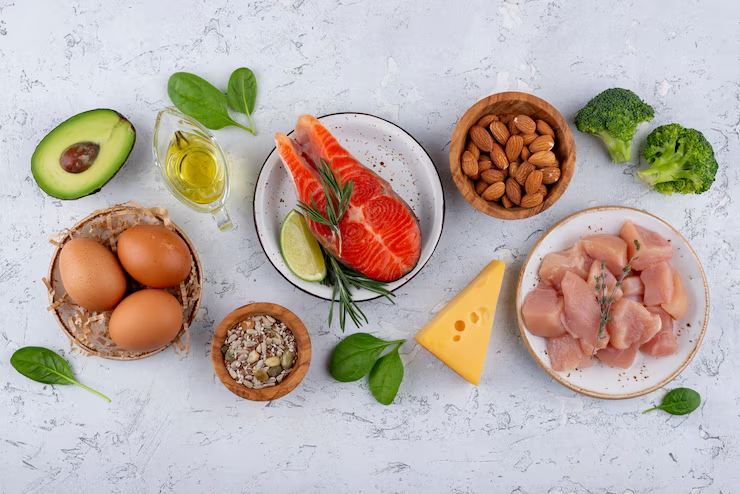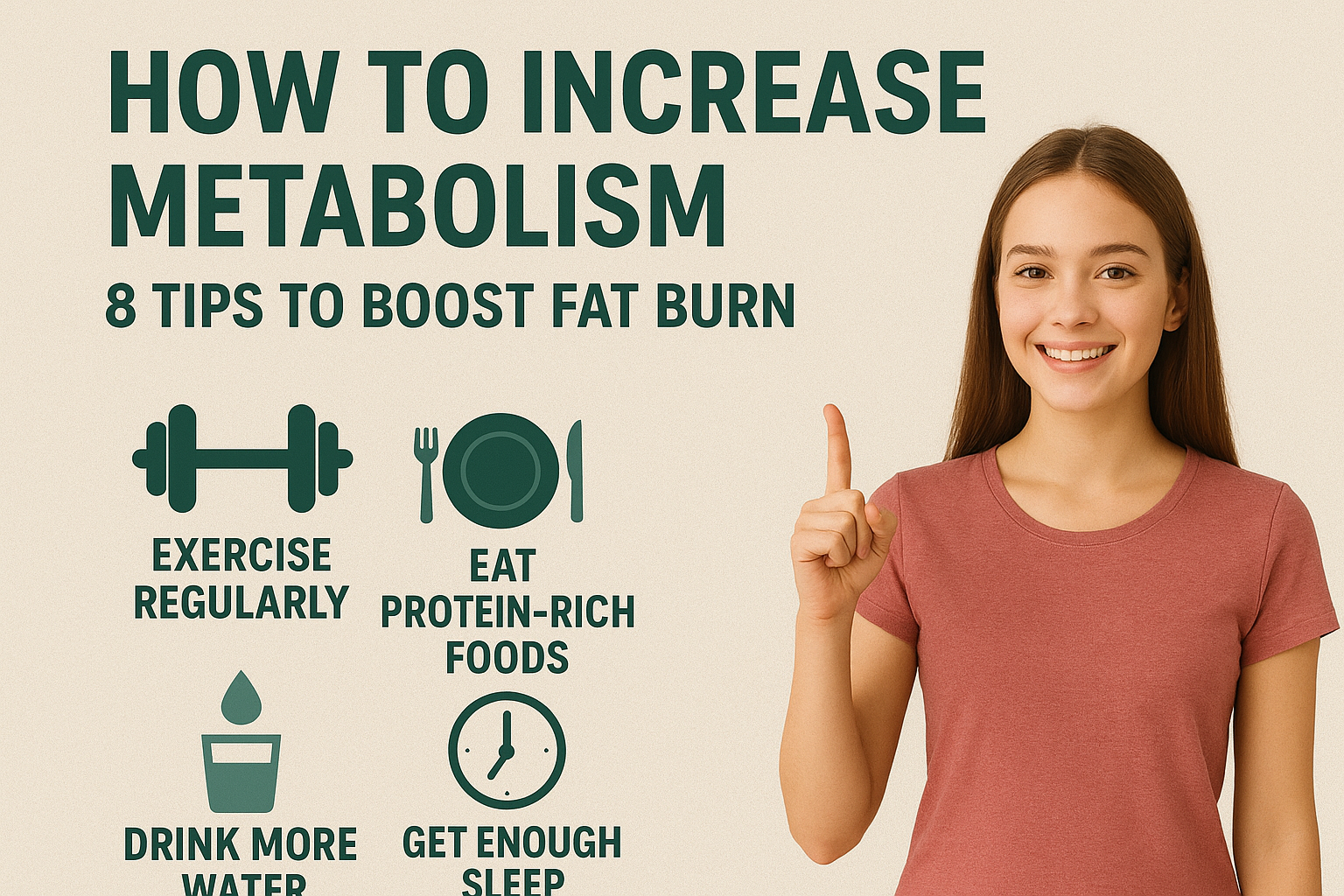Metabolism refers to the complex chemical processes that convert the food you eat into energy your body can use. It powers everything from breathing and blood circulation to cell repair and digestion. While some people naturally have a faster metabolism due to genetics, age, or body composition, others may find it harder to burn calories efficiently.
The good news is that you can learn how to increase metabolism through certain lifestyle changes. Regular physical activity—especially strength training—can build muscle, which burns more calories at rest than fat. Eating small, frequent meals, staying hydrated, and including protein-rich foods into your diet can also give your metabolism a noticeable boost.
Other effective tips on how to increase metabolism include getting enough quality sleep and managing stress, as both can affect hormonal balance and energy use. Additionally, adding metabolism-boosting habits like drinking green tea or moving more throughout the day can make a real difference. With consistency, these habits can lead to improved energy, better weight control, and overall health.
The truth is, your metabolism plays a critical role in how your body generates energy, burns calories, and maintains your overall health. While genetics do play a role, you have more control over your metabolic rate than you might think.
In this comprehensive guide, we’ll explore what metabolism is, how it works, and the top 8 evidence-based ways to increase your metabolism naturally.
What Is Metabolism ?

At its core, metabolism refers to the set of life-sustaining chemical reactions in your body that convert food into energy. This energy fuels essential functions such as breathing, blood circulation, cell growth, repair, and even cognitive activities like thinking. Metabolism is always active, even when you’re resting, which is why it plays a central role in your overall health and energy levels.
Your metabolic rate—how quickly your body burns calories—varies depending on factors like age, genetics, gender, and body composition. While some people naturally have a faster metabolism, others may find their metabolism slows down over time, especially with aging or a sedentary lifestyle. This can impact weight management and energy levels.
If you’re wondering how to increase metabolism, lifestyle changes are key. Incorporating strength training into your fitness routine helps build muscle, which burns more calories even at rest. Eating protein-rich foods, staying hydrated, and not skipping meals can also support a healthy metabolic rate.
Additionally, getting quality sleep, reducing stress, and staying physically active throughout the day can enhance metabolic function. By learning how to increase metabolism naturally, you support better energy balance, weight control, and long-term wellness.
Your Basal Metabolic Rate (BMR) is the number of calories your body burns at rest to maintain these vital functions. It accounts for 60–75% of your total daily energy expenditure.
Other contributors include:
Thermic Effect of Food (TEF): Energy used to digest and process food.
Physical Activity: Exercise and non-exercise activity thermogenesis (NEAT).
Hormones & Age: Thyroid function, insulin sensitivity, and hormonal balance.
Why You Might Want to Increase Your Metabolism ?
Boosting your metabolism does more than just help you burn extra calories—it can bring a range of health benefits, including:
Steadier energy throughout the day
Balanced hormone levels
Enhanced mood and mental clarity
Easier control over weight
More effective fat loss without restrictive diets
If you’ve been eating well and staying active but still aren’t seeing the results you expect, a sluggish metabolism could be the missing link. Supporting your body with metabolism-boosting habits might be exactly what you need to break through the plateau.
Top 8 Proven Tips How To Increase Metabolism
Build Muscle Through Strength Training

Muscle plays a key role in determining your resting metabolic rate. It’s considered metabolically active tissue, meaning it burns more calories even when you’re not moving. This makes building muscle one of the most effective strategies for boosting metabolism.
Every pound of muscle burns around 6 calories per day at rest, compared to just 2 calories burned by a pound of fat. While this might seem small, it adds up significantly over time, especially if you maintain regular strength training and physical activity.
If you’re looking for tips on how to increase metabolism, focusing on muscle-building exercises is essential. Activities like weightlifting, resistance training, or bodyweight workouts can help you gain lean muscle and keep your metabolism running efficiently, even during rest. Combined with proper nutrition and hydration, this approach supports better fat loss and long-term energy balanc
Why It Works
Strength training increases muscle mass, which raises your BMR.
After a resistance workout, your body continues to burn calories due to Excess Post-Exercise Oxygen Consumption (EPOC)—aka the “afterburn effect.”
How to Do It
Include full-body strength workouts 2–4 times per week.
Use compound movements like squats, deadlifts, push-ups, and rows.
Gradually increase weight and intensity to stimulate growth.
Eat Enough Protein at Every Meal
Protein is a powerful ally when it comes to boosting your metabolism. It has the highest thermic effect of food (TEF), meaning your body burns more calories digesting it compared to other macronutrients. About 20–30% of the calories in protein are used just for digestion.
In contrast, your body burns only 5–10% of carb calories and 0–3% of fat calories during digestion. This makes protein-rich meals more metabolically demanding, helping you burn more calories throughout the day without extra effort.
If you’re wondering how to increase metabolism, adding more protein to your diet is a smart move. Include lean meats, eggs, legumes, dairy, or plant-based protein sources in your meals. Not only does protein support fat loss and muscle maintenance, but it also helps keep you fuller for longer, aiding in appetite control and sustainable weight management.
Benefits
Boosts metabolism via TEF.
Helps preserve lean muscle during weight loss.
Reduces appetite and increases satiety, making it easier to eat less.
Tips
Aim for 20–30g of protein per meal.
Choose lean sources like chicken, turkey, eggs, Greek yogurt, tofu, legumes, and fish.
Consider a high-protein breakfast to kick-start your metabolism.

Move More Throughout the Day (NEAT)
Even small movements throughout the day can make a big difference in how many calories you burn. This is known as Non-Exercise Activity Thermogenesis (NEAT), which includes all the energy you use for everyday activities that aren’t considered formal exercise—like walking around the house, cleaning, gardening, or even fidgeting.
NEAT can significantly impact your total daily energy expenditure, especially if you have a sedentary job or lifestyle. By simply choosing the stairs over the elevator, standing more often, or adding short walking breaks to your day, you naturally burn more calories.
If you’re looking for ways on how to increase metabolism, focusing on NEAT is a great strategy. These small, consistent movements may not seem like much individually, but over time, they contribute to a more active metabolism and support better weight management and overall health.
Why NEAT Matters
NEAT can account for up to 15–30% of your daily energy expenditure.
Sedentary behavior significantly lowers metabolic rate over time.
Practical Ways to Increase NEAT
Take short walking breaks every hour.
Use a standing desk or walk while taking phone calls.
Do household chores more vigorously.
Park farther away and take the stairs.

Drink Plenty of Cold Water
Water is vital for nearly every function in the body, including digestion, circulation, and cellular activity. Staying well-hydrated ensures that your metabolism runs efficiently, as dehydration can slow down metabolic processes and reduce energy levels.
Interestingly, drinking cold water may offer a slight metabolic boost. This is due to water-induced thermogenesis—the body burns a small number of calories to heat the water to body temperature. While the effect is modest, it can contribute to increased calorie burn over time.
If you’re exploring how to increase metabolism, make hydration a priority. Aim to drink water consistently throughout the day, especially before meals and during physical activity. Not only does it support digestion and energy production, but it also helps manage appetite, making it easier to maintain a healthy weight and active metabolism.
Scientific Insight
Drinking 500 ml (17 oz) of cold water can increase metabolism by 10–30% for about an hour.
Water can also suppress appetite and reduce calorie intake when consumed before meals.
Tip
Drink at least 8–10 cups (2–2.5 liters) of water daily.
Replace sugary drinks with water or herbal teas.
Start your day with a glass of cold water.
Get Quality Sleep Every Night
Sleep is a crucial component of overall health, especially when it comes to metabolism. When you don’t get enough rest, your body struggles to regulate hormones that control hunger and energy use, leading to increased appetite and cravings for high-calorie foods.
Sleep deprivation also affects insulin sensitivity, making it harder for your body to process glucose efficiently. This can result in higher fat storage and a slower metabolic rate, making weight management more difficult over time.
If you’re wondering how to increase metabolism, prioritizing quality sleep is essential. Aim for 7–9 hours of restful sleep each night to support hormonal balance, energy levels, and metabolic efficiency. Creating a relaxing bedtime routine and minimizing screen time before bed can also help improve sleep quality and, in turn, boost your metabolism naturally.

Consequences of Poor Sleep
Increases cortisol (stress hormone), which promotes fat gain.
Reduces leptin (satiety hormone) and increases ghrelin (hunger hormone).
Reduces motivation to exercise or eat well.
Strategies
Aim for 7–9 hours of quality sleep per night.
Maintain a consistent sleep-wake schedule.
Avoid screens, caffeine, and heavy meals before bed.
Create a calm, dark, cool sleeping environment.
Drink Green Tea or Coffee (Caffeine Can Help)
Caffeine is a natural stimulant commonly found in coffee, tea, and some supplements. It works by stimulating the central nervous system, which can temporarily increase alertness, energy levels, and metabolic rate. This makes it a popular ingredient in many fat-burning products and a useful tool for those looking for ways on how to increase metabolism naturally.
Studies show that caffeine can enhance fat oxidation and slightly boost calorie burn, especially when consumed before physical activity. However, the effects may vary depending on individual sensitivity and tolerance to caffeine.
If you’re exploring how to increase metabolism, moderate caffeine intake may help. Drinking a cup of coffee or green tea before a workout can enhance performance and calorie expenditure. Just be mindful not to overdo it—too much caffeine can disrupt sleep and cause jitters, which may negatively impact your metabolism in the long run. Balance is key for using caffeine effectively to support metabolic health.
Research Shows
Green tea and coffee can increase energy expenditure by 3–11%.
Green tea contains EGCG, a compound shown to enhance fat oxidation.
Caffeine also improves exercise performance, indirectly supporting metabolic health.
Tips
Drink 1–2 cups of green tea or black coffee daily (without sugar or cream).
Avoid overconsumption (limit to 400 mg of caffeine/day).
Consider green tea extract supplements if approved by a doctor.
Eat Small, Balanced Meals Regularly

The idea that eating six small meals a day significantly boosts metabolism is a common myth. Research shows that meal frequency has little impact on your basal metabolic rate (BMR), which is the number of calories your body burns at rest. However, the quality and timing of your meals still matter when considering how to increase metabolism through balanced nutrition and stable energy levels.
Eating consistent, balanced meals throughout the day helps maintain steady blood sugar and insulin levels. This can prevent energy crashes, reduce cravings, and support better appetite control, which are all beneficial for overall metabolic health.
If you’re looking for ways on how to increase metabolism, focus more on what and how you eat rather than how often. Prioritize whole, nutrient-dense foods rich in protein, fiber, and healthy fats. This supports stable energy, promotes muscle maintenance, and keeps your metabolism functioning efficiently—regardless of how many meals you eat each day.
Why It Helps
Prevents energy crashes and overeating.
Supports a steady supply of nutrients and calories.
Keeps TEF active throughout the day.
Tip
Focus on nutrient-dense meals with protein, healthy fats, fiber, and complex carbs.
Don’t skip meals—especially breakfast.
Listen to hunger cues and eat mindfully
Reduce Stress to Balance Hormones
Chronic stress can take a serious toll on your body, especially your metabolism. When you’re stressed, your body releases more cortisol—a hormone that, in high levels, can slow metabolic function and promote fat storage, particularly around the belly. To counter this, managing stress effectively is a key strategy on how to increase metabolism and support overall hormonal balance.
Elevated cortisol also disrupts other key hormones like insulin and thyroid hormones, which are essential for maintaining a healthy metabolic rate. Over time, this hormonal imbalance can lead to weight gain, fatigue, and difficulty losing fat, even with a healthy diet and exercise routine.
To support your health and learn how to increase metabolism, managing stress is essential. Practices like deep breathing, meditation, regular physical activity, and adequate sleep can help reduce cortisol levels. Lower stress not only supports better hormonal balance but also helps keep your metabolism running efficiently for long-term wellness.
Impact on Metabolism
High cortisol levels promote cravings for sugar and fat.
Long-term stress may reduce lean muscle and increase fat retention.
Stress impacts sleep and energy levels—key to metabolic health.

Ways to Manage Stress:
Practice deep breathing, meditation, or yoga.
Exercise regularly to release endorphins.
Prioritize self-care and set boundaries.
Seek professional support if needed.
Common Myths About Metabolism
Myth 1: Thin people always have fast metabolisms.
Not necessarily. Many slim individuals may have average or even slow metabolic rates but maintain their weight through mindful eating or higher daily activity levels. Body size doesn’t always reflect metabolic speed.
Myth 2: Eating late at night slows metabolism.
Timing isn’t as critical as the quality and quantity of your food. While late-night snacking won’t automatically slow your metabolism, it can disrupt sleep and hormones—factors that influence how to increase metabolism effectively.
Myth 3: Aging ruins your metabolism.
It’s true that metabolism naturally declines with age—about 2% per decade after 20—but that doesn’t mean it’s out of your control. You can learn how to increase metabolism through regular strength training, staying active, and maintaining a balanced diet rich in protein and whole foods.
Conclusion

Metabolism is more than just a factor in weight management—it’s the engine that powers your entire body. It affects how efficiently you convert food into energy, influences your stamina, supports brain function, and helps regulate vital processes like hormone production and cell repair.
While your genetic makeup does play a role in determining your baseline metabolic rate, it’s not the whole story. Age, gender, and body composition also impact how your metabolism functions, but these factors don’t completely define your metabolic health or potential.
The good news is that you have real control over how efficiently your metabolism works. Daily habits such as eating balanced meals, staying active, building muscle, managing stress, and getting enough quality sleep can make a noticeable difference. By focusing on these healthy lifestyle choices, you can keep your metabolic engine running smoothly and support better energy, balance, and overall wellness throughout life.
FAQs
- How can I increase my metabolism naturally ?
Answer: To increase metabolism naturally, focus on building muscle through strength training, eating more protein, staying hydrated, and getting enough sleep. Regular physical activity, managing stress, and including metabolism-boosting foods like spicy peppers or green tea can also help rev up your metabolism. - How long does it take to see results when trying to increase metabolism ?
Answer: The time it takes to notice an increase in metabolism can vary. Some changes, like drinking cold water or adding HIIT workouts, can show results within a few hours. However, building muscle or improving sleep habits may take weeks or even months to yield significant improvements in metabolism. - Can drinking water help increase metabolism ?
Answer: Yes! Drinking cold water can temporarily increase metabolism by promoting thermogenesis, the process where your body burns calories to warm up the water. Staying hydrated throughout the day also helps keep your metabolism functioning at its best. - Does eating at night slow down your metabolism ?
Answer: Eating late at night doesn’t directly slow down metabolism, but large, heavy meals before bed can disrupt sleep and affect insulin sensitivity, which may indirectly impact metabolic processes. It’s best to have lighter, balanced meals earlier in the day to support metabolic health. - What are the best exercises to increase metabolism ?
Answer: Strength training and HIIT (High-Intensity Interval Training) are two of the best ways to increase metabolism. Strength training builds lean muscle, which burns more calories at rest, while HIIT provides a high afterburn effect, keeping your metabolism elevated even after the workout ends.

